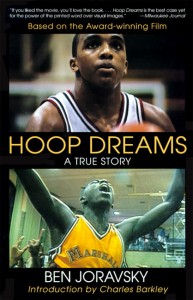Hoop Dreams
In the film, Hoop Dreams, filmmaker Steve James shows two African American boys, Arthur and William, as they face many challenges throughout their lives that come in the way of their original plans for their futures, basketball. There are numerous external struggles that they both encounter on their journey towards a career in basketball, which leads to important decisions that must be made by the boys and their family members.
The film begins with Arthur and William entering high school as freshmen, both with high expectations of who they wanted to be in the future. Both Arthur and William were promised to help achieve their goal by a recruiter in setting them up with scholarships from St. Josephs, a private high school in the suburbs of Chicago. The recruiter, while still trying to help the boys, had outside motives in recruiting the boys though. Both boys would end up leading very different lives from that point on. The recruiter, Mr. Smith, admits in the film that he wants Arthur to go to St. Joseph to help himself in his career as a recruiter and look superior for the coach. Arthur then starts to not do as well as hoped at his short time in St. Joseph, which leads him to lose his scholarship and be forced to return to his public school. Arthur’s mother openly admits that if she had realized that St. Joseph was not going to provide him with a scholarship his entire time there she would have opposed him going in the first place. On the other hand William excelled during his time at St. Josephs, and was promised a scholarship for college, but a catastrophic injury to his knee would prove to be too much to overcome. After William’s injury, his coach did not seem to care as much for him then as he did in the beginning.
I believe that the filmmaker, James, chose to depict individual agency the way he did because he wanted to portray how difficult it is to be in an industry where the players are treated like pieces of meat even from the time they are freshmen in high school. In one scene when William was being evaluated by college recruiters, one of the recruiters said, “They have NBA bodies already”. This shows recruiting in a negative way, because it shows that these people are usually only in it for the end game and how scouts and coaches make important life changing decisions for these young boys without care of possible negative outcomes. All in all, it was a sad story, but it is a story that many lessons can be learned from.






